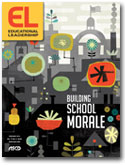"This is the 8th year in a row our state funds have been cut, and, once again, we'll be losing staff members from each of eight schools.""Our superintendent wants us to be the gold standard for rural schools. Yet we are such a long way from this.""Word walls were the rage last year; this year, all kinds of data are being thrown at us. How do I become a good teacher when I have so many things to do?""We are acting in a punitive way toward children. If they can't pass the test, we have to fail them—and they are in 1st grade.""I'm a principal married to a teacher. We have great conversations and learn from each other. But at my school, our faculty is stuck in adversary roles—adults against adults."
In the last few years, both in focus groups and surveys, EL editors have been asking educators about the challenges they face, and more and more educators have identified "building school morale" as a challenge. They often express their own or their colleagues' discouragement in the face of larger problems like those that Dina Strasser identifies: damaging teacher evaluation policies, a top-down infatuation with high-stakes testing, and a national myopia about the effects of poverty on students. Trying to raise teacher morale may seem to be a trivial pursuit when such important problems call for priority treatment.
Yet working in a school that has "a bad mood"—a collective state of mind that ranges from negativity to resignation, suspicion to resentment, wounded pride to despair—can have devastating consequences in itself. On the school level, as Megan and Bob Tschannen-Moran tell us, low morale can influence what people individually and collectively are willing and able to accomplish. Poor morale also affects the whole profession, reflected in fewer qualified candidates entering teacher training institutions; massive turnover; and record-low levels of job satisfaction.
It's easy to list problems that contribute to low morale, but what is it that builds high morale? In a review of research on motivation and accountability, Deborah Stipek (2013) cites a simple formula: autonomy, belonging, and competence. The authors in this issue would agree. When people do something because they want to, not because they have to, they work harder and are more creative (p. 14). When invited to the table for discussion (p. 64), they feel a sense of belonging and a deserved respect. When they improve at their craft, they experience pride in seeing improvement in students' learning (pp. 10, 20, 74).
Unfortunately, the recent direction of public policy runs counter to this winning formula. In an Atlantic article, John Tierney (2012) quotes the seminal research on school reform by Richard Elmore and Milbrey McLaughlin: "Policies that aim to reduce teacher discretion … can impede effective teaching." In other words, Tierney warns, "Policies and practices that are based on distrust of teachers and disrespect for them will fail. Why? 'The fate of the reforms ultimately depends on those who are the object of distrust.'"
In this issue, authors describe ways to rise above the anger and apathy engendered by simultaneously being treated as objects of distrust and being expected to change the world. Rafe Esquith says it well:
What keeps outstanding teachers going and doing a good job? It's the same thing that got them into the profession in the first place. Although many organizations and politicians claim to put the kids first, in reality teachers are the ones who do this. They are the ones who stand up every day in front of young people trying to inspire them and open doors that were previously closed. … We teachers are the key to staff morale. Because educators are rarely given their due, we need to appreciate one another.
In EL's 71st year of publication, it's a good time to remember what one of our authors wrote in EL's first issue. In "It's Patriotic to Teach," written during World War II, Eleanor Roosevelt wrote that unless teachers were directly called into the armed forces, they had a greater obligation and opportunity for service in the teaching profession than in any other work they could undertake. "I think a teacher is almost the most important person in a community," she wrote.
Eleanor is also famous for that inspiring line she herself took to heart: "No one can make you feel inferior without your consent."
<P ID="scherer-audio"><!-- Start of Brightcove Player --><!--div style="display:none"></div--><!--By use of this code snippet, I agree to the Brightcove Publisher T and C found at https://accounts.brightcove.com/en/terms-and-conditions/. --><!--********** this info needs to be updated for perspectives february 2014*************--> <!--<object id="myExperiencexxx" class="BrightcoveExperience"> <param name="bgcolor" value="#FFFFFF" /><param name="width" value="570" /> *** this value will be different if there is mobile video player info ***<param name="height" value="380" /> *** this value will be different if there is mobile video player info ***<param name="playerID" value="18377529001" /> *** may need new information here for the mobile video player *** <param name="playerKey" value="AQ~~,AAAAAmGjiRE~,escbD3Me8-wT_coVb7sTe18vG6vv3Oyk" /> *** may need new information here for the mobile video player ***<param name="isVid" value="true" /><param name="dynamicStreaming" value="true" /><param name="@videoPlayer" value="xxx" /> </object>--><!-- This script tag will cause the Brightcove Players defined above it to be created as soonas the line is read by the browser. If you wish to have the player instantiated only afterthe rest of the HTML is processed and the page load is complete, remove the line.--><!-- End of Brightcove Player --><!-- use this code for HTML --><!-- insert object tag here for feb2014 perspectives video-->


